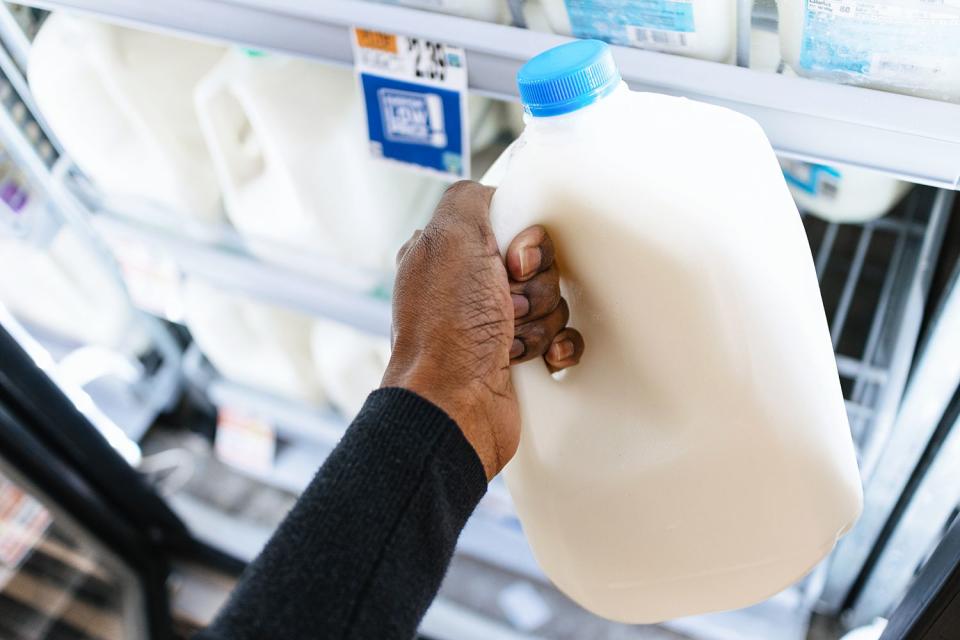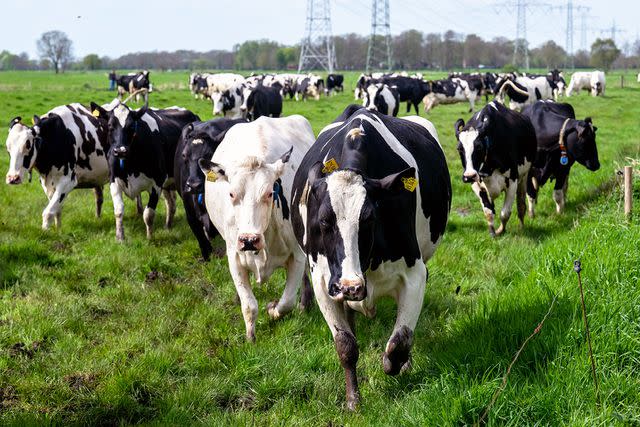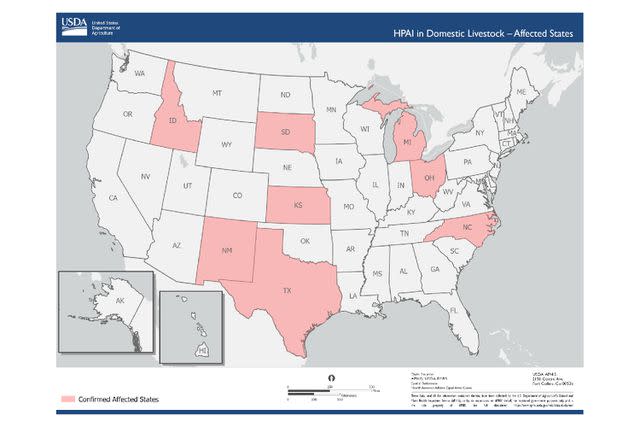Bird Flu 'Certainly Is Deadly' But Experts Say Milk and Eggs Should Be Safe for Now
The risk of contracting bird flu is low for most Americans, experts say

Getty
Stock image of milk at a grocery store.The Food and Drug Administration announced this week that fragments of the virus that causes bird flu — the highly contagious virus that’s commonly found in aquatic birds — have been found in samples of milk bought at the grocery store.
The news comes after reports that the virus, (highly pathogenic avian influenza, HPAI), has spread to dairy cows, which also resulted in one Texas resident contracting the disease. He'd had direct contact with an infected animal.
However, there’s no need to worry — yet — Dr. Joseph Khabbaza, Critical Care and Pulmonology at the Cleveland Clinic, tells PEOPLE.
Should humans be concerned about catching the virus?
“It certainly is very deadly, but thankfully it does not seem to be very contagious [to humans],” Habbaza said, explaining that while those who work closely with potentially infected animals could be at risk, “we're not really seeing person-to-person spread since it's been discovered.”
And as he pointed out, “bird flu is something we've known about for over two decades.”

Sina Schuldt/picture alliance via Getty
Stock image of dairy cows.Is it safe to eat milk and eggs?
While the virus was found in milk, Khabbaza tells PEOPLE that “pasteurized milk is going to be safe and also cooked eggs. In general, we should be cooking our eggs and not eating raw eggs. But as long as these are pasteurized dairy products and cooked foods, it really would eliminate any kind of risk to us.”
What about the virus particles detected in milk?
Khabbaza explained that the virus particles recently found in pasteurized milk indicate that the pasteurization process is actually working: “If a live virus is killed, as they are during a pasteurization process, then you'd expect to see some particles.“
“There's nothing at all that would suggest that having pasteurized milk, if there are virus particles, that is something that can cause actual viral infection and viral replication in a person who drinks that milk.”
“Based on the evidence that we have," Khabbaza said, "That's why the pasteurization is key.”
Related: Avian Flu Kills Record 50.54 Million U.S. Birds, Making It Worst Outbreak in History
Does the virus pose a risk to the larger food supply?
While our food supply appears safe, last week, the World Health Organization said there is “enormous concern” about the virus — which has been found in livestock in several states — evolving.

United States Departmant of Agriculture
“The great concern, of course, is that in doing so and infecting ducks and chickens — but now increasingly mammals — that virus now evolves and develops the ability to infect humans,” Dr. Jeremy Farrar — WHO’s chief scientist, said, according to a United Nations report.
“And then critically, the ability to go from human-to-human transmission.”
But as Khabbaza pointed out, we're not there yet.
Related: Man Dies After Having COVID for 613 Days
Does bird flu have the potential to become a pandemic like Covid?
This is nowhere near Covid-levels of concern, says Khabbaza.
“This would be completely different than four years ago in Covid, because there's no human-to-human transmission that really occurs.”
As he added, “A very small, very tiny percentage of people are even at risk of getting infected. So, if you work in one of those fields where you have very close exposure to cattle and wild birds and poultry, those are the people who have to be most vigilant.”
“If it shows that there's a level of human-to-human transmission like we haven't seen before, and then you find clusters where there is a human case reported, then you start seeing people in that person's bubble starting to get sick,” he explained, adding if “you have a region that starts getting lots of people going to the hospital or having flu-like symptoms ultimately manifesting to death. That's when you'd get nervous.”
But as for now, “For the the vast majority of Americans, there should be no Covid-like fears.”
Never miss a story — sign up for PEOPLE's free daily newsletter to stay up-to-date on the best of what PEOPLE has to offer, from celebrity news to compelling human interest stories.
For more People news, make sure to sign up for our newsletter!
Read the original article on People.

